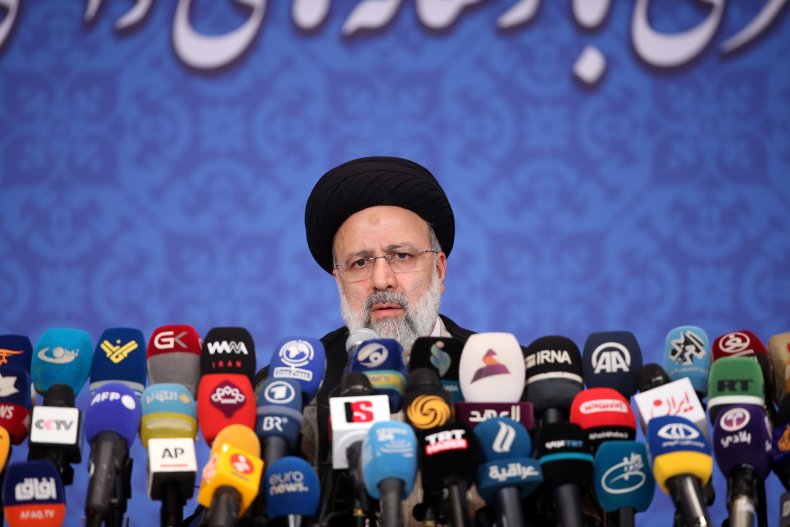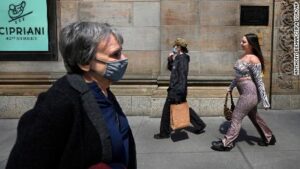Severe drought in southwestern Iran has prompted the latest wave of anti-government protests inside the authoritarian country in recent days, as the new president Ebrahim Raisi, a hardliner known as “The Butcher,” prepares to enter power.
The drought is Iran’s worst in 50 years and has caused water shortages for homes and businesses, while also choking the vital hydro electrical network leading to frequent blackouts.
In southwestern Khuzestan province, people have taken to the streets chanting “death to the dictator.” Security forces reportedly used deadly force against them. At least two people are believed to have been killed in five nights of protests.
“The current protests in Khuzestan are just one of many domestic crises Ebrahim Raisi will face,” Sina Toossi, a senior research analyst at the National Iranian American Council, told Newsweek.
The unrest comes at a sensitive time in Iran. Raisi—nicknamed “The Butcher” from his time as the head of Iran’s judiciary—will take office in early August after his electoral victory to replace the more moderate incumbent, President Hassan Rouhani.
Soon after, nuclear talks with U.S. President Joe Biden‘s administration are expected to resume with the goal of reviving the Joint Comprehensive Plan of Action (JCPOA).
Raisi’s election is seen as an entrenchment of the conservative ideologues in Iran. Outgoing Rouhani was considered a reformist, though critics of the theocracy say there is no such thing under the ideological umbrella of the Islamic Republic.
The incoming president’s bloody past sparked concerns about a new authoritarian era under his leadership. He is backed by Supreme Leader Ayatollah Ali Khamenei, Iran’s elderly ruler who has one eye on ensuring a smooth transition to his eventual successor.
Raisi will come to power amid an economic crisis in Iran. Decades of international and U.S. sanctions have stunted the country’s development while sabotage and accidents have degraded industrial infrastructure.
Protests over water, new taxes, working conditions, local autonomy, and systemic repression have challenged the regime, which routinely resorts to violence to quell dissent.
The unrest in the oil-rich and ethnically diverse province stems from climate change-driven drought and mismanaged water projects. But many of the problems there are emblematic of the economic malaise that has settled over the rest of the country.
“The situation in Khuzestan may not escalate into broader protests but addressing the grievances of the people there and throughout the country will be a major challenge for Raisi’s administration,” Toossi told Newsweek.
“Raisi will have to be pragmatic and draw on the knowledge of technocrats to stabilize the country various domestic crises, which include massive discontent and disillusionment with the political status quo, a new wave of COVID-19 infections and deaths, strikes in Iran’s oil sector, and water shortages in parts of the country.”
But the Americans should be cautious in interpreting the unrest in Khuzestan and elsewhere as a sign of regime weakness, said Sanam Vakil, the deputy director of the Middle East North Africa program at the British Chatham House think tank.
“Iran has been through multiple rounds of protests, and they very much delink the unrest and activism inside the country from national security issues,” she told Newsweek.
“I think that the political system feels quite confident that they can manage these issues. They have a monopoly of coercive control. They’ve become increasingly more repressive…just over the past five or six years.”
Indeed, the establishment could even spin the existence of protests as proof that they are not as repressive as their critics say. The changing of the guard might allow Raisi to shake off some of the criticism.
“The Raisi administration is going to use what looks like a breakdown and point fingers for that breakdown at the Rouhani administration,” Vakil said. “They’re thinking: ‘Well, we definitely can do better than this.'”
JCPOA talks offer the hope of sanctions relief, but not without nuclear and foreign policy concessions. Any perceived surrender to American demands risks backlash from the conservatives whose momentum helped lift Raisi into the presidency.
“If Raisi sees the Vienna talks through and returns Iran to the 2015 nuclear accord, he will benefit from sanctions relief that will help in improving the domestic economic situation,” Toossi said.
“If, on the other hand, Raisi assembles a hardline negotiating team and seeks concessions in Vienna that go beyond the nuclear deal, the sanctions could worsen, and Iran may get more isolated internationally.
“If Raisi hopes to be a successful president, he must put ideology to the wayside and be pragmatic in both foreign and domestic policy.”
The Biden administration has remained positive about its chances of JCPOA success since the president took office in January. Repeated attacks by Iranian-backed militias against U.S. troops in Iraq, Tehran’s advancing nuclear program, and tensions in the Middle East’s strategic waterways have not deterred the White House.
A State Department spokesperson told Newsweek the administration is closely following the situation in Khuzestan province, including reports of security forces firing on protesters.
“We support the rights of Iranians to peacefully assemble and express themselves, which they should enjoy without fear of violence and arbitrary detention by security forces,” the spokesperson said.
Iran’s cascading crises don’t spell the imminent end of the Islamic Republic, whatever opposition groups and hawks in the U.S. might hope.
Repression has “castrated civil society activism,” Vakil said: “I don’t think that in a climate of economic and serious economic downturn economic protests are going to lead into something that is going to be collective and hugely mobilized.
“People tend to organize and mobilize and articulate their grievances when they’re not hungry and worried about their next meal.”
The Islamic Republic remained resilient throughout Rouhani’s time in office. It appears unlikely that Raisi’s term will bring a shift.
“This is a political establishment that doesn’t decide to negotiate or not negotiate—or enter or renege on the JCPOA—based on their GDP per capita or GDP growth…They will make those decisions based on regime stability and regime survivability,” Vakil told Newsweek.
“They have borne the brunt of economic pain from sanctions for the past 10 years and they feel like the shock of those variables have already been absorbed by the system. So if they drag things out a bit longer, they feel like they can take it right. And that people can take it.”
Meghdad Madadi ATPImages/Getty Images



















